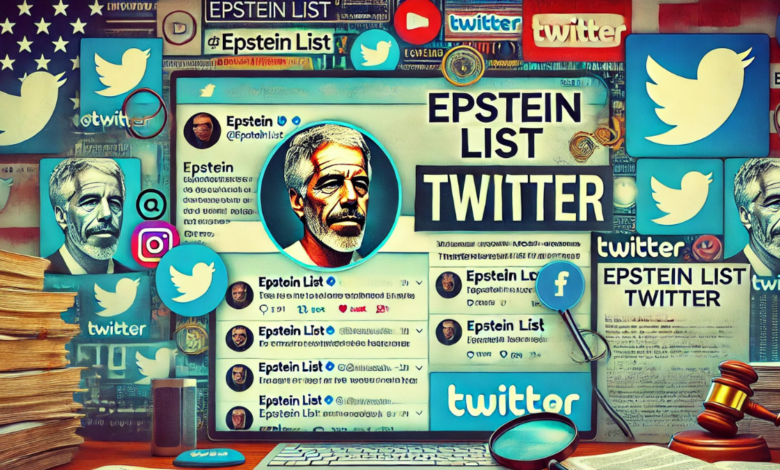The Epstein List Twitter: Unveiling the Truth and Its Impact

Introduction
The Epstein List Twitter case, which revolves around financier Jeffrey Epstein’s criminal activities, has sparked global outrage and intrigue. The revelations about Epstein List Twitter abuse and the network of influential people allegedly involved have created lasting media attention, especially after his arrest and subsequent death. A particular aspect of the case that generated even more discussion is the “Epstein list,” which is often discussed and shared on platforms like Twitter. This article explores the Epstein list, how it became a viral topic on Twitter, and its lasting impact on public discourse and media coverage.
What Is the “Epstein List Twitter”?
The term “Epstein List Twitter” refers to a collection of names and details of individuals allegedly associated with Jeffrey Epstein’s criminal activities. This list includes public figures, politicians, business leaders, and celebrities, many of whom have been implicated in Epstein’s notorious sex trafficking ring. However, it’s crucial to understand that not all the names on the list have been confirmed or proven to have participated in criminal activity.
The origins of the Epstein List Twitter lie in court documents, flight logs from Epstein’s private jets, and testimonies from victims. While some names have been made public through legal channels, many individuals associated with Epstein have denied any involvement in his crimes. Despite the lack of concrete evidence for some of the names on the list, the speculation and rumors surrounding these individuals continue to fuel public discourse, particularly on social media platforms like Twitter.
The Epstein List Twitter gained significant traction as people began sharing these names online. As with any high-profile case, the desire for accountability and justice led to widespread discussions on social media, with many using Twitter as a primary platform to voice their opinions and share information.
How the Epstein List Became a Trending Topic on Twitter
With its fast-paced, real-time nature, Twitter has become a crucial space for breaking news, sharing opinions, and shaping public opinion. The Epstein list was no exception. As new developments in the Epstein case emerged, users on Twitter began discussing the list of names allegedly involved in Epstein’s criminal activities. A single tweet or trending hashtag could quickly amplify the conversation, leading to viral moments.
One of the most significant factors that led to the Epstein list trending on Twitter was the involvement of conspiracy theories. As the list began circulating, some Twitter users connected it to larger, more far-reaching claims, such as ideas about a global elite involved in child exploitation. These conspiracy theories often led to sensationalist tweets that got widespread attention, pushing the Epstein list into the spotlight even further. The hashtag #EpsteinDidntKillHimself gained viral popularity as it resonated with individuals who believed Epstein’s death was not a suicide but part of a more extensive cover-up.
Another factor contributing to the Epstein list’s prominence on Twitter was the platform’s capacity for real-time discussions. As news about Epstein’s arrest and subsequent death spread, users began to share their thoughts, theories, and pieces of information. The sharing of these pieces, whether confirmed or not, only fueled the conversation and ensured that the Epstein list remained a trending topic for months.
The Impact of the Epstein List on Public Perception and Media Coverage

The Epstein list became more than just a trending topic on Twitter; it shifted public perception and influenced how the mainstream media covered the case. The constant stream of information, discussions, and speculation led to an atmosphere of distrust and curiosity. As more individuals were named on the list, the general public grew increasingly suspicious of influential figures who might have been connected to Epstein. This curiosity extended beyond just the victims of Epstein’s crimes; it involved a broader question of accountability for influential individuals in society.
Mainstream media outlets were often slow to adopt the Epstein list narrative, initially focusing on verified criminal activity rather than the conspiracy theories swirling around. However, the viral nature of the topic on Twitter forced some media organizations to cover the growing conversation. Public outcry and social media discussions pushed these outlets to delve deeper into the connections between Epstein and prominent figures.
Despite the influence of Twitter, the spread of unverified information surrounding the Epstein list also raised concerns about misinformation. The ethical debate surrounding sharing the list of names prompted questions about defamation, privacy, and fairness. Could sharing such speculative information lead to harm, even when some individuals named in the list were never proven to be involved in Epstein’s crimes? This question has remained at the forefront of the conversation about the Epstein list on Twitter.
Legal and Ethical Implications of Discussing the Epstein List on Twitter
The viral spread of the Epstein list on Twitter raises essential legal and ethical concerns. Legal experts warn that individuals who share defamatory or unverified information about others could face legal action, mainly if their tweets cause reputational damage. Many of the individuals on the Epstein list have issued public denials, and in some cases, they have threatened legal action against those who share baseless claims.
Additionally, Twitter has faced scrutiny for its role in allowing the spread of the Epstein list. As a platform that encourages free expression, Twitter must balance users’ right to share information with the need to protect individuals’ privacy and prevent harm. In response to the Epstein list discussions, Twitter has taken down some accounts and tweets for violating its policies on misinformation and harassment.
On the other hand, some users argue that social media platforms like Twitter should allow discussions about the Epstein list to continue as long as they fall within legal bounds. They believe that public figures, especially those associated with Epstein’s crimes, should be held accountable for their actions. However, the question remains: how can a platform like Twitter ensure these discussions don’t cross into baseless accusations or harm?
Conclusion
The Epstein list on Twitter has undoubtedly become one of the most viral and controversial aspects of the Epstein case. Its spread on social media has amplified the public’s demand for justice, sparked intense debates about privacy and ethics, and brought attention to the darker side of power and corruption. However, it’s crucial to recognize the potential dangers of sharing unverified information, as it can lead to reputational harm, misinformation, and legal ramifications.
As the case unfolds, the public and social media platforms need to balance raising awareness and protecting individual rights. The Epstein list may remain a focal point in the public conversation. Still, it’s essential to approach the topic cautiously, verify facts, and acknowledge the ethical responsibilities of discussing such sensitive matters.
FAQs
- What is the Epstein list, and why is it important?
- The Epstein list refers to a compilation of names linked to Jeffrey Epstein’s alleged criminal activities. It has drawn attention due to the influential figures associated with Epstein.
- Why did the Epstein list become a topic of discussion on Twitter?
- The Epstein list gained traction on Twitter because of the viral nature of the case, fueled by conspiracy theories, social media discussions, and the public’s demand for justice.
- How did Twitter handle the controversy surrounding the Epstein list?
- Twitter took action by removing tweets and accounts that violated its policies on misinformation and harassment while allowing some discussions to continue within legal guidelines.
- What legal risks exist for sharing Epstein-related content on social media?
- Sharing unverified content about the Epstein list could lead to defamation claims and legal action if it damages an individual’s reputation.
- Did the Epstein list influence public opinion or media coverage?
- Yes, the discussions on Twitter and the viral spread of the Epstein list pressured mainstream media outlets to cover the issue more extensively, impacting public opinion.
You May Also Read: https://latestcryptonewz.com/discord-color-text/



